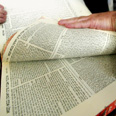

Illustration
Photo: Ata Awisat
We are usually hesitant to say that there are real differences between men and women. On the other hand, we support the right of any woman to choose motherhood over an academic career.
Research in the development of the brain points to differences between the brains of men and women. This angers many people. But the statement that men are bigger and stronger than women does not. Why is our reaction different in regard to the brain? Logically, a bigger body would hold a bigger brain. Does the fact that men are stronger lead us to make value judgments about them or about women?
I have yet to encounter a job that requires a brain of a specific size. We will always be able to find a woman who is stronger or bigger than any given man, but ultimately, a man will be at the top of the scale. So what? There is no added value to being at the top of the scale of height or brain volume.
All about Sarah
How does this relate to parashat Hayyei Sarah? I would like to correct the impression created by our sages of women in general, and Sarah, in particular. In the midrash, Abraham is mentioned more than twice as often as Sarah. Let’s examine a few midrashim in the hope of leveling the playing field.
A woman who loved her husband (Genesis Rabba 45): “So Sarai, Abraham’s wife, took her maid, Hagar the Egyptian – She took her in words. She said to her, how lucky you are that you will cleave to this holy body.” Despite her later jealousy, Sarah is glad that Hagar can be with Abraham.
Although it may not be politically correct to say, Sarah knew how to bake (Genesis Rabba 48): “Abraham hastened to the tent to Sarah, and said: Quick, (three seahs of choice flour! Knead and make cakes!). Rabbi Eviatar said, she baked nine seahs - three for cakes, three for pudding, and three for confections.”
She shares her good fortune with others (Genesis Rabba 53): “Sarah said: God has brought me laughter (everyone who hears will laugh with me). When Sarah was remembered, many other barren women were remembered with her, hearing was restored to many deaf, sight was restored to the blind, and the insane regained their lucidity.”
Modest and generous (Genesis Rabba 53): “That Sarah would suckle children – it does not say here that she suckled a son. Our mother Sarah was too modest. Our father Abraham said to her, this is no time for modesty. Uncover your breasts so that all will know that God has begun to do miracles. She uncovered her breasts and they were flowing with milk like two springs, and women come and she would nurse their children.”
Understands God’s will: When she counsels Abraham to banish Hagar and Ishmael, God says to Abraham “whatever Sarah tells you, do as she says”
Loves her son, and allows us to fulfil God’s commandments (Midrash Aggada Genesis 23): “Sarah’s lifetime – why does Sarah’s death follow the Sacrifice of Isaac? It is to tell us that when Abraham returned from Mount Moriah, he found that Sarah had died because of Satan’s words (telling her about the sacrifice). Therefore, we blow the shofar on Rosh Hashanah, so that Sarah’s death will be our penance, since the sound of the shofar is a sigh and a wail.”
Sarah was a woman who struck a balance between her public role and her family life. It is my hope that by examining the sources that discuss Sarah, we will begin to correct what needs to be set right.
Torah Roundtable by Rabbi Dr. Alexander Even-Chen
Sarah lived a hundred and twenty-seven years; these were the years of the life of Sarah. And Sarah died at Kiriath Arba – that is Hebron – in the land of Canaan; and Abraham came to mourn for Sarah.” (Genesis 23:1-2)
These verses have raised many questions. For example, we read in the midrash:
And Abraham came to mourn for Sarah – Where did he come from? Rabbi Levi said: He came to Sarah from burying Terah. Rabbi Yossi replied: But did not Terah’s burial precede Sarah’s by two years? Rather, where did he come from? He came from Mount Moriah, and Sarah died from that grief. Therefore, the Sacrifice of Isaac is followed by “these were the years of Sarah’s life” (Genesis Rabba 58:5).
- Why does the midrash ask where Abraham came from?
- What would we learn if he came from far away?
- What would we learn if he came from close by?
- If Rabbi Levi is correct, and Abraham came from burying Terah, what can we infer in regard to the timing of the Sacrifice of Isaac? Did it precede Terah’s death, of which we are told at the end of parashat Noah? Rabbi Yossi argues that Rabbi Levi is mistaken. What does he suggest?
- Is there a connection between the Sacrifice of Isaac and Sarah’s death? Is Rabbi Yossi correct? What caused the grief that led to Sarah’s death?
Abraham then returned to his servants, and they departed together for Beer-Sheba; and Abraham stayed in Beer-sheba. (Genesis 22:19)
- Sarah died in Hebron. Did Sarah and Abraham meet after the Sacrifice of Isaac?
- Did Abraham distance himself from Sarah after the Sacrifice of Isaac? If so, why?
- Following the Sacrifice of Isaac, did the separation from Abraham compound the grief that brought on Sarah’s death?
Rabbi Dr. Paul Shrell-Fox, head of the Jewish Family and Community Studies track at the Schechter Institute , and rabbi of the Yaar Ramot Congregation in Jerusalem















